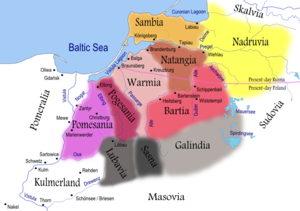Nadruvians

Nadruvians and other Prussian clans during the 13th century
|
|
| Total population | |
|---|---|
| Extinct in 17th-18th century | |
| Regions with significant populations | |
| Languages | |
| Old Prussian, later also German | |
| Religion | |
| Prussian mythology (Paganism) | |
| Related ethnic groups | |
| Other Prussians and Balts |
The Nadruvians were one of the now-extinct Prussian clans. They lived in Nadruvia (alternative spellings include: Nadruva, Nadrowite, Nadrovia, Nadrauen, Nadravia, Nadrow and Nadra), a large territory in northernmost Prussia. They bordered the Skalvians on the Neman River just to the north, the Sudovians to the east, and other Prussian tribes to the south and west. Most information about the clan is provided in a chronicle by Peter von Dusburg.
In 1236 Peter of Dusburg wrote that Nadruvia was the location of Romuva, the sacred center of Baltic religion. From Romuva Kriwe, the chief priest or "pagan Pope", ruled over the religion of all the Balts. No other sources mention the place. Scientists have considerable doubts if such an organized structure existed.
As the northernmost clan, Nadruvians were conquered last by the Teutonic Knights, a German crusading military order. In 1230 the Knights set up their base in the Chełmno Land and proceeded to conquer all pagans and convert them to Christianity. The first military encounters between Nadruvians and the Knights began ca. 1255 when the Knights were trying to conquer Sambians, western neighbors of Nadruvians. Dusburg alleges that Nadruvians had several fortresses with strong garrisons. Two distorted names are given (Otholicia and Cameniswika) and it is very difficult to identify their location. Nadruvians built another castle at Velowe when the Knights reached their lands. Sambians had to surrender in 1277, but the conquest of Nadruvians was delayed by the Great Prussian Uprising that broke out in 1260. The uprising ended in 1274, and Nadruvians fell in 1275. Prussian fortress at Velowe was captured by the Germans and renamed to Wehlau. A handful of Nadruvians retreated into Grand Duchy of Lithuania. The rest were incorporated into the Monastic state of the Teutonic Knights and merged with German Settlers. Eventually, sometime after the 16th century, Nadruvians became extinct.
...
Wikipedia
